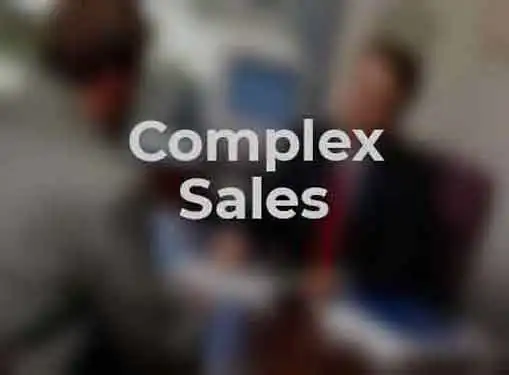Entrepreneurial Selling
Closing a Complex Sale
The biggest money in sales is made on complex sales. Smart salespeople recognize this and gradually move towards more sophisticated selling. If you are on that path, here are some great selling tips for a complex sale.
Complex selling is new ground for you, but you aren't concerned because sales are sales, right? Not so fast.

Complex sales are a completely different game and you had better know what the rules are before you jump in the arena.
Unlike most sales processes, complex sales involve long sales cycle and multiple decision-makers. That means you need to be prepared with an approach that is designed to engage several prospects over the long haul. Additionally, competition for complex sales is often fierce, with several first-rate players vying for the prospect's business. To maintain an edge, you'll need to tweak your usual strategy and tailor your method. Here are some tips to help you get started.
Determine whether the contract is really up for grabs.
Sometimes a business will release a RFP (Request for Proposals) even though the contract has already been unofficially rewarded to a certain company. So why release a RFP? Because they know that throughout the sales process, they will gain insights and information that will be critical for implementation. That's good news for them, but a big waste of time for you and your company. Discover early whether or not the contract is actually available and plan your actions accordingly.
More steak, less sizzle.
In many selling situations, the presentation is the key to a successful sale. However, complex sales are different. Sure, the presentation is important, but decision-makers will also be looking for substantive input throughout the long selling process. If you place your entire focus on the presentation and neglect the less glamorous aspects of selling your product, plan on going home early in the process.
Emphasize performance early and price late.
During the initial phase of the sales cycle, most prospects will tell you that price isn't nearly as important as performance. They simply want to end up with a product that does what they want it to do when they want it to do it. But as the process winds down, price becomes increasingly important. In fact, once the prospect has narrowed down their decision to a few choices, price often becomes the determining factor. As a complex seller, that means you'll need to emphasize your products performance early on, but be prepared to talk price when it really counts.
Leave emotional attachments at the door.
The long sales cycle of complex selling practically invites sellers to become emotionally involved in the process. After investing months of time and energy into a prospect, it's only natural to expect a payoff at the end. However, emotional attachments can sometimes convey a sense of desperation - a big turnoff to your prospective client. No matter how invested you are in the process, remember that at the end of the day it's just business. Stay calm and allow room for the prospect to decide based on the merits of your company and its products.
Know your limits.
In complex selling, prospects expect a certain amount of initial advising. The problem is that initial advising can easily cross over into a situation where a prospect is exploiting sales personnel as free labor. Know the difference and enforce limits when appropriate.
Share this article
Additional Resources for Entrepreneurs




Conversation Board
We greatly appreciate any advice you can provide on this topic. Please contribute your insights on this topic so others can benefit.